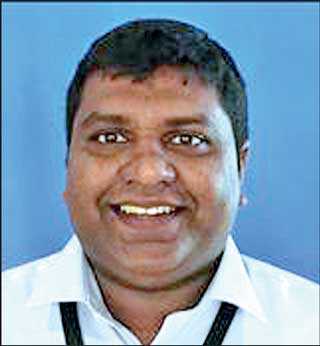Tuesday Feb 24, 2026
Tuesday Feb 24, 2026
Monday, 18 May 2020 00:00 - - {{hitsCtrl.values.hits}}
By Medha de Alwis
Facebook recently held a virtual briefing to the media explain its efforts around the novel coronavirus (COVID-19) public health crisis.
Facebook Sri Lanka Policy Programs Manager Yasas Vishuddhi Abeywickrama and Public Policy Manager Senura Abeywardena shared key insights to the work that has been done to keep people informed and safe during the COVID-19 global health emergency.
 |
Facebook Sri Lanka Policy Programs Manager Yasas Vishuddhi Abeywickrama |
 |
Facebook Sri Lanka Public Policy Manager Senura Abeywardena |
Initiatives included key updates to policies such as misinformation, commerce and content, product updates across the Facebook family of apps, the way Facebook is partnering with health organisations, communities and other key stakeholders to support the global response to this unprecedented challenge.
Facebook said it has been streamlining to the environs of COVID-19. Being one of the more used social media platforms where views are made and broken, Facebook explained efforts taken in terms of being responsible and to be of service.
Its Facebook COVID-19 Information Centre, featured at the top of News Feed, includes real-time updates from global and local health authorities as well as helpful resources about staying healthy, supporting your community, social distancing and preventing the spread of COVID-19.
In-feed and top-of-feed pop-ups on Facebook and Instagram direct users to the World Health Organization (WHO), US Centre for Disease Control (CDC) or local health authorities. When searching for COVID-19 on Facebook or tapping a COVID-19 related hashtag on Instagram, a pop-up is seen. Facebook also shows the accounts of leading health organisations at the top of searches related to the virus.
As of 16 April, over two billion people had been directed to resources from the WHO and other health authorities through the COVID-19 Information Centre and pop-ups on Facebook and Instagram, with over 350 million people clicking through to learn more. In Sri Lanka, users are directed to Sri Lanka’s COVID-19 Information Centre, which provides links to health advice and information from the WHO, UNICEF and Sri Lanka’s Health Promotion Bureau (HPB).
Following are some of the specific initiatives.
WhatsApp World Health Organization Health Alert is another free to use offering and provides timely, reliable information about how to prevent the spread of COVID-19, myth debunking and more.
To contact the WHO Health Alert, the number +41 79 893 1892 needs to be saved into phone contacts and then message ‘Hi’ on WhatsApp to get started. The service launched was in English but is rolling out in all six UN languages (English, Arabic, Chinese, French, Russian and Spanish) over the coming weeks.
Messenger COVID-19 Community Hub contains tips and resources to keep people connected to their community, and prevent the spread of misinformation. It also includes advice on how to recognise and avoid scams and misinformation online. This is a global resource and is available in English, Thai and Vietnamese.
Facebook Group Admins Community Site connects Facebook Group Admins with information from health authorities to share with their communities, as well as product tips and resources.
Limiting misinformation and harmful content
Facebook Misinformation Policy enables the removal of COVID-19 related misinformation that could contribute to imminent physical harm. Posts that make false claims about preventions, cures and treatments are removed.
Debunking claims that don’t directly result in physical harm, like conspiracy theories about the origin of the virus, in partnership with the network of over 60 fact-checking partners covering over 50 languages. Once a piece of content has been fact-checked as false, it is demoted in News Feed and labelled.
Between 1 March and 16 April, eight new fact partners had been added to expand coverage to more than a dozen new countries. In the month of March, warnings were displayed on about 40 million posts related to COVID-19 on Facebook, based on around 4,000 articles by independent fact-checking partners.
When users see those warning labels, 95% of the time they did not go on to view the original content. Hundreds of thousands of pieces of misinformation that could lead to imminent physical harm too have been taken down.
Sri Lanka fact checking partner reports are available in factcheck.afp.com/afp-sri-lanka. Fact checking report for the other partner in Sri Lanka, Fact Crescendo, can be found in srilanka.factcrescendo.com/archives/
News Feed messages is a feature launched in mid-April to reach people who have liked, reacted or commented on harmful misinformation about COVID-19 that has since been removed from Facebook.
These messages connect people to COVID-19 myths debunked by the WHO, including ones that are removed from the platform for leading to imminent physical harm. There is a need to connect people who may have interacted with harmful misinformation about the virus with the truth from authoritative sources in case they see or hear these claims again off of Facebook.
Community standards
Coordinating harm
To coordinate harm, Facebook removes content that encourages self-injury or real world harm. In a COVID-19 context this includes content that encourages the further spread of COVID-19, for example, events encouraging people to break quarantine and spread COVID-19.
Content in all of these areas will be removed when the platform receives an escalation via news reports, trusted partners or multiple user reports. This includes hate speech, bullying, harassment and an Advertisement Policy which prevents people from running advertisements that try to exploit the situation by claiming that a product can cure COVID-19, or through price gouging of essential items such as medical masks, hand sanitiser, test kits or disinfectant.
Supporting global and local health authorities
Disease prevention maps help inform forecasting models for the spread of COVID-19. Leading researchers are empowered at Harvard University’s School of Public Health and National Tsing Hua University in Taiwan by sharing aggregated mobility data and high resolution population density maps. Co-location maps reveal the probability that people in one area will come in contact with people in another, helping illuminate where COVID-19 cases may appear next.
Movement range trends show at a regional level whether people are staying near home or visiting many parts of town, which can provide insights into whether preventive measures are headed in the right direction.
The social connectedness index shows friendships across states and countries, which can help epidemiologists forecast the likelihood of disease spread, as well as where areas hardest hit by COVID-19 might seek support.
Symptom survey is now available globally and is an opt-in survey run by Carnegie Mellon University which asks people if they have symptoms such as fevers, coughing, shortness of breath or loss of smell that are associated with COVID-19.
Researchers will correlate feedback with public data about confirmed cases of COVID-19, and ultimately be able to forecast the spread of the disease. Facebook will use aggregated data from the university to produce interactive maps based on symptom surveys and will update them daily.
Free advertisements have been provided to the World Health Organization for as long as they need during the COVID-19 outbreak, in addition to other in-kind support to local and global health organisations. In Sri Lanka, Facebook provided ad credits to the Health Promotion Bureau to boost COVID-19 information.
Supporting local communities and businesses
Keeping services stable and reliable in this time of peak connectivity is a priority at present. Usage patterns are carefully monitored, making the system more efficient and adding capacity when needed. In many of the countries hit hardest by the virus, total messaging increased more than 50% in March. Similarly, in places hit hardest by the virus, voice and video calling more than doubled on Messenger and WhatsApp.
WhatsApp COVID-19 Information Hub provides simple, actionable guidance to healthcare workers, educators, non-profits, governments and small businesses on staying connected and sharing information with their communities.
The Hub launched in partnership with UNICEF, United Nations Development Program (UNDP), the World Health Organization (WHO) and the Poynter Institute’s International Fact-Checking Network, which received a $ 1 million donation to help fight COVID-19 related misinformation.
Supporting SMBs on Instagram
Instagram for Business Playbook created to inspire and educate SMBs on the ways they can use Instagram to stay connected to people, build resilience and manage through the COVID-19 outbreak.
Order food
People can now support their favourite restaurant or cafe by ordering takeaway food via new tools on Instagram. Clicking the ‘Order Food’ profile button or Stories sticker will take people straight to a food delivery site to complete a purchase.
Business Resource Hub contains tips and training to help businesses navigate challenges during the COVID-19 outbreak and support their customers during this time.
Free e-learning courses and virtual training programs have been created to help businesses navigate this challenging time. In Sri Lanka, medium and large enterprises are trained through the local chambers of commerce. Facebook also worked with ICTA to train micro businesses and grass roots entrepreneurs through ICTA.